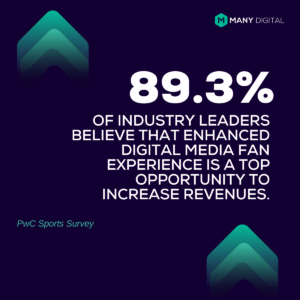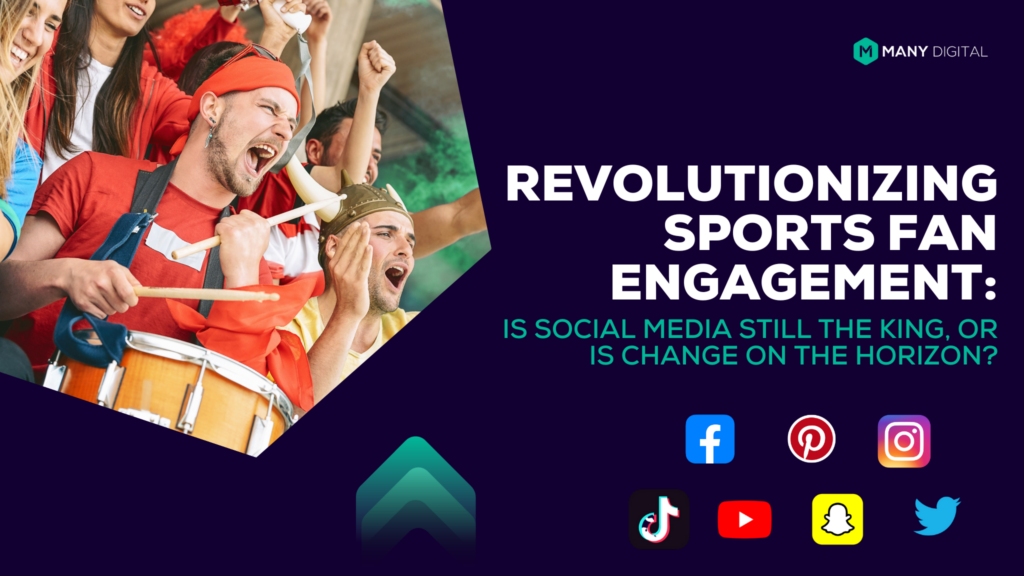Sports fan engagement:
Is Social Media Still the King, or Is Change on the Horizon?
In a rapidly transforming digital landscape, sports leagues and teams are reshaping their approach to fan engagement, pivoting towards sports apps as the focal point.
In this blogpost we will give you some insights on why building up your own fanbase and not being too dependent on Social media is a good idea.
The rise of social media platforms like Meta(Facebook & Instagram), TikTok and X(formerly Twitter) have given sports big clubs communities on “borrowed” platforms with high engagement and reach.
Like various industries, sports entities established their content and digital fan communities on the expansive territories of these influential platforms.
While leagues and teams focused on their core sports operations, the concept of exchanging awareness and engagement for “rented” fan relationships seemed logical.
However, there’s a paradigm shift underway. Sports properties are awakening to the significance of not just dominating the physical fan experience but also claiming ownership of the digital counterpart. It’s becoming increasingly clear that in the future, this digital ownership will hold even greater importance.
In today’s sport marketing space, sports organizations should see themselves as media agencies with self-owned digital media inventory. Taking ownership of their digital fan experience and high-quality content production.
By being in control of owned fan data and media inventory you will avoid relying too much on third-party social media companies.
In recent years, heightened emphasis on cookies, Intelligent Tracking Prevention (ITP), GDPR, and data compliance, coupled with significant shifts in algorithm tracking capabilities, has made it increasingly challenging to extract the same value from third-party social media platforms as in the past.
Digital inventory empowers right-holders with a new revenue stream while providing brands an efficient access to new media.
In this evolution, sports entities have come to recognize a truth long understood by traditional media companies: Fan engagement is an aspect that cannot be delegated. The driving forces behind sponsorship revenue, ticketing, and merchandise sales are anchored in fan loyalty and engagement.
The logical approach to that involves directly engaging audiences within their proprietary content domains, such as sports fan apps.
From Likes to Loyalty: Redefining Sports Engagement Beyond Social Media Algorithms
Social media platforms in sports – a dead man walking? NOT at all!
Social media platforms still have very clear and strong strengths and opportunities in the digital fan journey.
Now adays we are used to move us around on different channels across devices and platforms. And we cannot change the user’s normal user behavior across various medias. The users will go in the direction of their immediately attention and interest. Social media will therefore be a key part of the journey to build awareness and engagement with your sports brands.
While social media acts as a starting point, assisting rights holders in attracting new and casual fans, the core of digital media activity unfolds within their exclusive sports apps. Social media serves as a conduit, guiding followers towards the true genesis of their journey—on proprietary territory, where genuine fan-consumer relationships are fostered.
To build up that long-term relationship a self-owned mobile digital experience is vital – converting the most loyal and engaging followers to revenue-driven and loyal fans in the longer term is of high importance. They need to change the mindset from collecting likes to build long-term-loyalty on collected fan data.
Did you know....
Our clients on average convert 35% of their followers on social media to active app users.....
Devoted sports enthusiasts are more intentional about visiting the premier sports app for their preferred sports content compared to aimlessly scrolling through a social app for various reasons. On social platforms, the visibility of your content is contingent upon the algorithm’s fluctuations, and there’s a chance they might not encounter your content at all.
Rather than revealing your best content directly on social media, leverage it to provide sneak peeks accessible to a broader audience. Reserve the exclusive exposure of your top-tier content for your self-owned digital fan app. This strategy ensures that social media acts as a promotional tool for a wider audience, while the most devoted fans are incentivized to convert for daily access to exclusive content. This approach trains your fans to seek their sports-related content within your ecosystem, fostering loyalty and enabling the collection of valuable first-party data.
Are you building up fan data-silos on social media?
The biggest concern in relying too much on social media and outsourcing the fan relationship is the ownership of fan data. By building up data silos on social media you will not have the same control and ownership of the users and given away the potential revenue-stream.
In the ever-evolving landscape of technology, significant shifts are on the horizon at the moment. From Google contemplating the depreciation of cookies to Elon Musk’s strategic moves with Twitter(X), the scrutiny over TikTok’s security, Apple’s debates on app revenue cuts, and Facebook’s ambitious venture into the metaverse, the industry is at a crossroads. These developments mark potential inflection points that may reshape how these technologies are employed.
For teams and leagues in sports, this underscores the urgency of prioritizing first-party fan data collection. Directly engaging with fans and comprehending their behaviors has become not just advantageous but imperative in navigating the uncertainties of the tech realm.
Leveraging First-Party Fan Data
By embracing owned apps, sports properties gain control over first-party user data, enabling personalized experiences, targeted marketing, and lucrative fan opportunities. By building up your own digital ecosystem, you can consolidate data sources instead of spreading them across various data silos.

One way to go is connecting all data-sources from app, website, ticketing system, email marketing platform in one centralized customer-data-platform (CDP) and thereby be able to act across different fan touchpoint, you will get a clear picture on your fans behavior based on first-party data.
81% of companies are either completely or substantially dependent on third-party cookies.
Unleased the potential of your fan engagement data
By seeing the clubs or sports organization as a media agency you will be able to build up new revenue-streams from your digital inventory in self-owned platforms, like your sports fan app.
If you are looking to maximize your digital commercial potential and offer extended returns to your sponsors in this digital sports age, you need to be able to understand your data and your digital potential.
Fan engagement apps has completely transformed the way sports clubs connect with their fans, so that your valuable fan engagement data can be more than just engagement—it’s an opportunity for revenue growth!
In the dynamic landscape of sports engagement, the move towards mobile sports apps signifies a strategic evolution. Sports properties are not just leading fans closer but ensuring enduring fandom. Social media and sports fan apps coexist, but owned spaces emerge as the optimal digital arenas for cultivating lasting connections and optimizing content investments.
Want to know more about our fan engagement solution?
At Many Digital we have developed a Fan engagement white-label app, which connects all the exciting and exclusive features for a devoted fan in a one-stop-shop solution. Here the fan will find news, content, livescore, streaming access, ticketing, loyalty program, coupons, and games.
Besides that, we have built a commercial backend engine, where the clubs and rightsholders can analyze and manage all user behavior and furthermore, they can set up and activate sponsorship campaigns in a new way.



